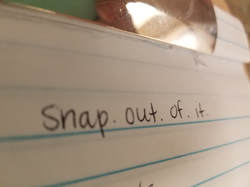|
I’ve realized more and more how powerful vulnerability is as a teacher - with my students, with my colleagues. With you. We all know it isn’t shiny and glossy all the time, and to present myself in a way that implies that is unfair. So here I am - sending off one of my low moments to the world, packaging up my vulnerability so it might be medicinal instead of toxic. Because, last week, on Thursday, I found myself struggling more than usual with my depression. As my students wrote about rhetorical strategies and The House on Mango Street. I wrote what follows.  Snap, Out. Of. It.
I optimistcally scrawled it across the top of my To Do list this morning. Like a warning. Like telling myself would bring me back. Like positive self talk might work this time. Affirmations. Positive thinking. Growth mindset. I can hear myself cycling through the mantra over and over again, trying to use the same tools I use to encourage my students. Obviously, it isn't working. And it's probably because these things are all good and all important, but they ignore one glaring question: What about when it’s chemical? Because words don't to much against poison being pumped from your brain, especially when it feels as if it’s already rewired your thinking permanently, even immobilized you. The reality of depression is ugly, and I hate the say it, but those positive words just don’t do much when you have to keep swallowing the sobs in your throat. And they don’t do much when you can’t steady your hands long enough to write on the board. And they don't do much when everything feels artificial and pointless. But that’s what I’m up against today. As a teacher fighting through depression and anxiety, sometimes I feel like an imposter. Like I’ve been replaced by this uglier version of myself. On my ugly days, I struggle with the guilt. The physical pain. The frustration. The fatigue. I just struggle. Completely. And I think the worst part is that I have no idea when it’ll let up. Every second is a string of the same questions: How many days will I wake up with the weight of an iron vest pinning me to my bed? How many days will I have to keep reminding myself to put on this fake smile? How many days can I lie, throwing out a “Fine” when my students kindly ask how my day is going? Because without some end in sight, I worry about my students. I can maybe fake it for a day, but pretty soon it starts to interfere with my lessons. I find myself swapping active, engaging lessons for those things they can do independently while I let myself drown a bit. It quickly becomes a disservice. Then, I fight with myself about staying home in the hopes a day of rest might resurrect me - but that, again, is just another disservice. And in my heart, I know it doesn't work that way anyhow. So the guilt thickens the poison. I try to fortify myself with a half hearted smile and pray they won’t notice because it’s terrifying if - even for a moment - they realize it isn’t Cwik standing at the front of the class but this evil twin. And I hope - no, plead - that tomorrow will be better and the fog will pass. And I evade one horrible, taunting truth. That they deserve better.
0 Comments
Leave a Reply. |
Archives
February 2024
AuthorSteph Cwikla has been a teacher since 2012, focusing on ELA curriculum. Now, she also works as an instructional coach, helping other teachers improve engagement and instruction. |
 RSS Feed
RSS Feed